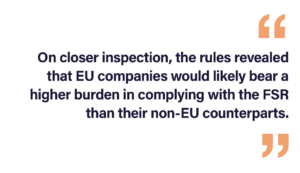
A blessing or a curse?
The Foreign Subsidies Regulation, enacted by the European Union (EU) in 2023, gave many European companies the hope that it would allow them to compete on a level playing field against non-EU companies benefitting from unfair subsidies. Yet according to Adrian Emch, vice chair of the European Chamber’s Legal and Competition Working Group, things are not necessarily working out like that.
European Union (EU) companies with a significant business presence in China probably have mixed feelings about the EU’s Foreign Subsidies Regulation (FSR).
During the legislative process and following its enactment, there was widespread satisfaction among EU companies about the FSR. Many observers felt that some companies had enjoyed an unfair advantage by receiving subsidies from non-EU governments, allowing them to outcompete their rivals in the EU market — especially given that the EU’s state aid rules prohibit member states from providing such support.
Although the FSR applies to all companies regardless of their nationality, judging from the comments put forward during the legislation consultation process, many stakeholders assumed that the regulation would mainly be enforced against non-EU companies, which were thought to be the main beneficiaries of subsidies granted by non-EU governments. With long-standing concerns about unfair subsidy policies, EU companies with operations in China were especially hopeful about finally achieving a level-playing field with their Chinese competitors.

However, in February 2023, their hopes were dashed when the European Commission (EC) released its first set of draft rules for implementing the FSR. On closer inspection, the rules revealed that EU companies would likely bear a higher burden in complying with the FSR than their non-EU counterparts.
Fast-forward to April 2024, the FSR has been in force for around nine months and the filing regimes have passed the 100-day mark. To mark the occasion, at the end of February 2024, the EC published the FSR Brief, recapping developments from the first 100 days of FSR enforcement.[1] The release of the publication makes this an ideal time to take stock and review what the FSR has achieved, and what this means for EU companies doing business in China. This can be achieved by examining each of the three procedural mechanisms under the FSR.
Ex officio procedure
In an ex officio investigation, the EC examines past conduct by companies, in particular whether they have obtained subsidies from non-EU governments and have used these subsidies to distort competition in the EU market.
Following the investigation, if the EC concludes that a company has indeed obtained subsidies which distort competition in the EU, it can take ‘redressive measures’ to undo the damage caused by the distortion (but cannot fine the company). The FSR itself contains a non-exhaustive list of quite far-reaching redressive measures, including reduction of capacity or market presence, divestment of assets, changes to governance structure and repayment of foreign subsidies.
So far, the EC does not appear to have launched any ex officio investigations. Since the EC has some discretion on what cases to bring under this procedure, it can reasonably be expected that EU companies will not be among the first targets.
M&A filing regime
The FSR has established a suspensory mergers and acquisition (M&A) filing regime with certain numeric thresholds that are not based directly on the underlying substantive problem (that is, foreign subsidies and distortion in the EU). Instead, the thresholds are two-fold:
- The first threshold looks at whether the parties to an M&A deal (including the creation of a joint venture controlled by at least two parent companies) have received aggregate foreign financial contributions above euro (EUR) 50 million in the three years before the deal.
- The second threshold creates a ‘local nexus’ requiring the target or the joint venture (including their subsidiaries) to have had aggregate EU turnover of at least EUR 500 million.
EU companies have grown less enthusiastic about the M&A filing regime since the FSR’s enactment. For one, the term ‘financial contribution’ is much broader than ‘subsidy’ as it basically means the countervalue of any dealings with governmental entities. For example, selling shares, goods or services to them, or purchasing goods or services from them, amounts to receiving a financial contribution — even if the compensation for the transaction is done at market rates and the company does not obtain an advantage as such.
EU companies doing business in China frequently come across government actors in their commercial activities. For example, paying an electricity bill in China may amount to a foreign financial contribution because the utility is often a state organ or state-owned company, hence many EU companies have realised that their China activities can contribute to triggering filing thresholds.
According to the FSR Brief, from 12th October 2023 to 20th January 2024, the EC engaged in pre-notification discussions with parties to M&A deals in 53 cases, 13 of which were EU-to-EU transactions and 33 of which were EU-to-non-EU transactions.[2] Although there is no country-specific information in the FSR Brief, anecdotal evidence suggests that there were few, if any, deals involving Chinese companies among the 53 transactions.
In short, EU companies have started to realise that—given the second threshold’s focus on EU turnover—they are the companies most likely to have transactions for which the target or joint venture is above the threshold. As a result, EU companies seem to be disproportionately impacted by the M&A filing obligation.
Public procurement filing regime
Similar to the M&A filing regime, the FSR has also established a suspensory filing regime for participation in certain EU public procurement procedures. Again, the thresholds triggering the filing obligation are not based on the substantive problem (foreign subsidies and distortions in the EU), but on financial contributions and a local nexus:
- The first threshold looks at whether a company submitting a bid in a public procurement procedure has received foreign financial contributions of at least EUR 4 million per non-EU country in the three years before the tender.
- The second threshold creates a local nexus requiring that the estimated value of the public procurement procedure be at least EUR 250 million.
Even if a company does not meet the filing thresholds, it needs to make a declaration and disclose foreign financial contributions below the thresholds.
The first threshold is even lower than for the M&A filing regime, and most EU companies with significant business in China will probably need to assume they meet the financial contribution threshold.
In addition, similar to M&A filings, it is likely that EU companies participate considerably more often in large EU tenders compared to non-EU companies, hence the filing obligation will rest heavily on them.
There are no statistics on public procurement filings in the FSR Brief. However, on 16th February 2024, the EC announced its first in-depth investigation of a public procurement filing procedure.[3] The company placed under investigation was an affiliate of a large Chinese state-owned producer of rolling stock. On 26th March it was announced that the company had withdrawn from the tender.[4] So far this is the only Chinese company to have entered the in-depth investigation phase.
Takeaways
The enforcement of the FSR is at an early stage. During the initial 100 days following the commencement of filing obligations, the main focus of the EC has been to review notifications filed under the M&A and public procurement filing regimes.
Statistics suggest that many of these filings were made by EU companies or by parties doing transactions with EU companies, hence the filing obligations have increased the compliance burden of EU companies.
Going forward, for EU companies with an important business presence in China, the FSR will continue to be a double-edged sword. On the one hand, the FSR may develop into an instrument helping to create a level-playing field with Chinese competitors. On the other, EU companies’ interactions with government entities in China may contribute to them triggering the filing thresholds, thereby raising compliance obligations for their M&A deals and tender projects in the EU.
Whatever their specific exposure, it is clear that EU companies doing business in China will be right in the middle of the fast-developing enforcement of the FSR.
About the author:
Adrian Emch is a partner at Hogan Lovells, the international law
firm, and the vice chair of the European Chamber’s Legal and Competition
Working Group.
[1] Moscoso, L, & Stoyanova, I, Competition FSR brief, European Commission, February 2024, viewed 21st March 2024, <https://competition-policy.ec.europa.eu/document/download/22197012-2036-4b1e-8b02-0eb8b2d6e666_en?filename=kdar24001enn_competition_FSR_brief_1_2024_100-days-of-FSR-notification-obligation.pdf>
[2] Moscoso, L, & Stoyanova, I, Competition FSR brief, European Commission, February 2024, viewed 21st March 2024, <https://competition-policy.ec.europa.eu/document/download/22197012-2036-4b1e-8b02-0eb8b2d6e666_en?filename=kdar24001enn_competition_FSR_brief_1_2024_100-days-of-FSR-notification-obligation.pdf>
[3] Commission opens first in-depth investigation under the Foreign Subsidies Regulation, European Commission, 16th February 2024, viewed 21st March 2024, <https://ec.europa.eu/commission/presscorner/detail/en/ip_24_887>
[4] Statement by Commissioner Breton on withdrawal by CRRC Qingdao Sifang Locomotive Co., Ltd. from public procurement following the Commission’s opening of an investigation under the Foreign Subsidies Regulation, European Commission, 16th March 2024, viewed 1st April 2024, <https://ec.europa.eu/commission/presscorner/detail/en/statement_24_1729>


Recent Comments